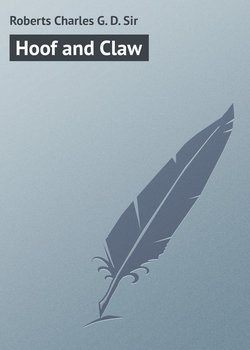Читать книгу Hoof and Claw - Roberts Charles G. D. - Страница 4
The White Wolf
ОглавлениеOn the night when he was born, in the smoke-smelling wigwam beside the lone Michikamaw, there had come a strange, long howling of the wind amid the cleft granite heights which overhung the water. At the sound the fainting girl on the pile of deerskins opened eyes which grew suddenly wild and dark. She listened intently for a moment, and then groped for the little form which had been laid at her breast.
"That is his name," she muttered. "He shall be called Wind-in-the-Night."
The old squaw, her husband's mother, who was attending upon her, shook her head.
"Hush, my daughter!" she said soothingly. "That is not the wind. That is the old white wolf howling on the mountain. Let us call him White Wolf, since he is of the totem of the wolf. And perhaps the old white wanderer, who disdains to hunt with the pack, will befriend him and bring him good fortune."
"His name is Wind in-the-Night," said the young mother, in a voice suddenly loud and piercing. Then she turned her head toward the wall of the wigwam wearily, and, with a sharp sigh, her spirit passed from her lips, hurrying out over the black spruce ridges and barren hills to seek the happy hunting grounds of her fathers.
The old woman snatched up the child, lest the mother's spirit in passing should lure it away with her.
"Yes," she cried hastily, hiding the little one in a fold of her blanket and glancing over her shoulder, "his name is Wind-in-the-Night."
It would never have done – as the father afterward agreed – to gainsay the child's mother at that moment of supreme authority, but the old woman had her misgivings; for she believed it was the white wolf, not the wind, who had spoken in that hour, and she trembled lest the child should come under his ban.
As the years passed, however, it began to appear that the old squaw's fears were groundless. Among the lodges beside the bleak Michikamaw the child grew up without misadventure; and when he was big enough to begin his boyish hunting and to follow the trails among the dark spruce forests, it began to be rumored that he was in some special favor with the wolf folk. It was said – and, though he could not be persuaded to talk of it, he was never known to deny it – that the old white wolf, whose howling was like the wind in the mountain clefts, had been seen again and again following the boy, not obtrusively, but at a little distance and with an air of watching over him. Certain it was that the boy was without fear to go alone in the forest, and went always as if with a sense of being safeguarded by some unseen influence. Moreover, whenever the wind howled in the night, or the voice of the solitary wolf came quavering down, like the wind, from the granite heights, the boy would be seized with a restlessness and a craving to go forth into the darkness. This impulse was quelled sternly by his father until the lad was old enough and wise enough to restrain it of his own accord; but it was not held, among the tribe, to be any unaccountable or dreadful thing that the boy should be thus compassed about with mystery, for this was the tribe of the Nasquapees, the "Wizards," who were all mystics and credited with secret powers.
As Wind-in-the-Night grew to manhood, the white wolf grew less and less conspicuous in his affairs, till he came to be little more than a tradition. But at any time of crisis there was sure to be some suggestion of him, some reminder, whether in a far-off windy howl that might be wolf or might be wind, or else in a gaunt, white shadow flitting half-seen across the youth's trail. Whether, as all the tribe took for granted, it was always the same wolf, a magic beast forever young and vigorous, or whether the grim warder who had presided over the child's birth had bequeathed his mysterious office to a descendant like himself, is a point that need not be decided. Suffice to say that when, at the age of eighteen, Wind-in-the-Night underwent his initiation into the status of full manhood, a great white wolf played an unbidden but not unlooked-for part in it. When, during that long and solitary fasting on the hilltop, the young man's fainting eyes saw visions of awe and unknown portent, and strange, phantasmal shapes of beast and bird came floating up about him with eyes of menace, always at the last moment would come that pallid, prowling warder and drive the ghosts away.
* * * * * *
It was a bad winter. In the gray fishing village at the mouth of the Natashquouan came word to Wind-in-the-Night that certain of the scattered bands of his tribe in the interior were near to starving. He had been now some six months absent from home, guiding a party of prospectors, and his heart was troubled with desire for the little, lonely cluster of lodges on the shore of the Michikamaw. He thought of his own spacious wigwam of birch bark, with the crossed poles projecting above the roof. With a pang of solicitude, he thought of the comely and kindly young squaw, his wife, and of that straight-limbed, copper-colored little five-year-old, his son, whose dark eyes danced like the sunlight on the ripples, and who would always run laughing to meet him and clutch him by the knees so sturdily.
